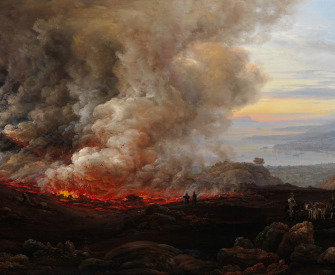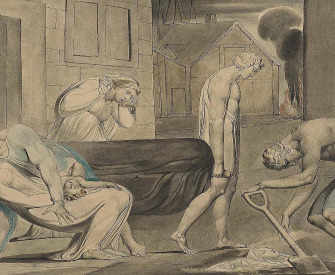Why listen to me? I can only predict epidemics and plagues.
—Larry Kramer, 1992Solidarity and Survival
Whether it’s earthquakes, famines, or floods, the social contract is continuously put to the test in times of calamity.
By Garret Keizer
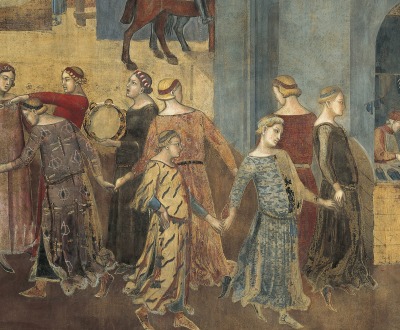
Dancers in The Peaceful City, detail of the fresco Allegory of Good and Bad Government, by Ambrogio Lorenzetti, 1338–40.
From lightning and tempest; from earthquake, fire, and flood; from plague, pestilence, and famine, Good Lord, deliver us.
—The Great Litany, Book of Common Prayer
Earthquake and Fire
My Uncle Howie was a city fireman for much of his working life, and when he finally took his pension and headed for the hills of West Virginia it was in large part to escape the city. He’d had his fill of late-night false alarms and recreational arson and was opting for a simpler life. Like Voltaire’s Candide, survivor of the Lisbon earthquake and the Inquisition too, my uncle was going to find solace in cultivating his own garden. He was never going to eat a store-bought potato again.
One day while bouncing along the ridges of Almost Heaven he came upon two sooty-faced children walking listlessly down the road—because, as they explained when he halted his pickup alongside them, their house was burning down. It was the sort of thing that happened now and again in that neck of the woods. There wasn’t much a body could do except watch the fire or walk away from it.
Soon my uncle was heading north to barter with his former cronies for various hand-me-downs at the station, used slickers and helmets, cast-off axes, and even an old fire truck, driving them back to his adoptive hollow’s first volunteer fire department, of which he was duly elected chief. The moral being that you can turn your back on civilization if you like, but you’re not necessarily going to escape the social contract.
Ditto for its bosom buddy, muse, and patron: Disaster. “Like a good neighbor,” goes the signature ad for an insurance company, “State Farm is there.” Whatever it has to say about the firm, the motto reminds us that neighborhood was the original insurance. There’s intuitive sense in the fact that one of the nation’s best-known founders, Ben Franklin, also founded a fire department. If the God of the Mosaic Covenant is “a consuming fire,” the seal of the secular covenant is a fire extinguished. In their symbolism no less than their bravery, the New York City firefighters who responded to the 9/11 attacks were well-qualified to be popular heroes. The towers fell, crushing some of them, but their presence reassured us that the social contract still stood.
We rightly think of “the discovery of fire” as one of humankind’s first significant steps toward civilization; paradoxically, it is civilization that gives fire its full status as calamity. All those close-built, overcrowded houses; all those incendiary livelihoods, the bakery and the forge. A similar paradox informs the way in which conflagrations both underscore and subvert social inequality. The great fires of Rome (64) and London (1666) did their worst among the poor, and when the singed mob wanted scapegoats, it looked first among the margins of the populace: Dutch and French immigrants in London, Christians in Nero’s Rome. Mrs. O’Leary’s cow, spuriously blamed for starting the Great Chicago Fire (1871) by kicking over a lantern, might have escaped suspicion had Mrs. O’Leary been of Anglo-Saxon stock.
At the same time, and as a runaway blaze will inevitably show, fire is no respecter of persons. No upstart can climb the social ladder faster. At the first outbreak of the Great Fire of London, the Lord Mayor dismissively declared that “a woman could piss it out.” No need even for a crew of obliging lads to open their breeches. By the third day of destruction, King Charles II himself was leading the firefighting efforts, most of which involved preemptive demolitions of buildings in the fire’s path. Whimsy pictures the Restoration monarch’s Cavalier curls cascading from under a fireman’s helmet. Still sour from a civil war in which their parliamentarian sympathies had not fared well, Londoners had hitherto looked askance at their sovereign, like dubious West Virginians sizing up the city fellow with his tater patch. Charles looked better to them after the fire. A writer for The London Gazette reported how “his Royal Highness never despairing or slackening his personal care wrought so well that day.” If only for a short while, King and Commons had been one.
Tempest and Flood
Perhaps a more vivid sense of the ever-looming possibility of disaster would bring us closer to the Beloved Community, would inspire more of what Camus called “our solidarity against death.” Flannery O’Connor puts her finger on the possibility better than I can when she has one of her characters recognize, a moment before she is murdered, that even murderers are her children and thus her responsibility. “She would of been a good woman,” her killer observes, “if it had been somebody there to shoot her every minute of her life.” So, perhaps, would we all.
When my wife and I visited the Netherlands several years ago, it was suggested to us that the country’s egalitarian ethos—so deeply ingrained that the Dutch consider it in poor taste to list one’s academic titles on a business card and obligatory to shake hands with women and children as well as men—was a byproduct of the nation’s centuries-old struggle with the sea. Everyone had to lend a hand in holding back the water; everyone’s thumb had to be ready to plug the dike. No room for beautiful people and their private pools. We also heard that a common course for Dutch celebrities is to leave the country before its traditional disgust with ostentation drives them out.
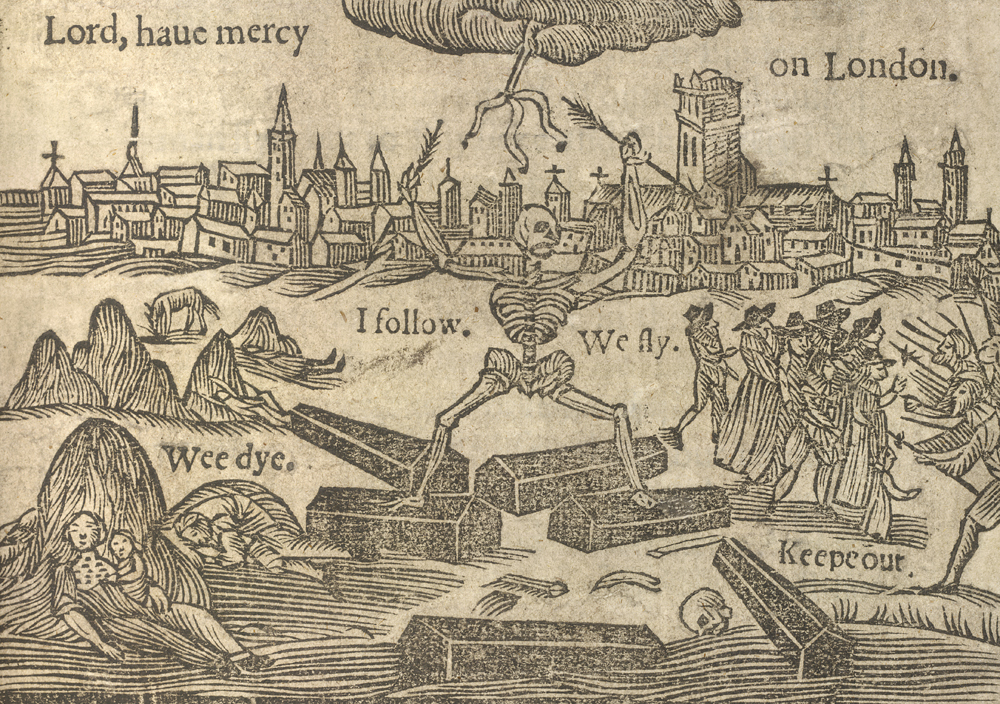
Woodcut from A Rod for Runaways, by Thomas Dekker, 1625. © British Library / Art Resource.
“Here a wretched race is found,” Pliny the Elder observed of the Lowlands in the middle of the first century, “inhabiting either the more elevated spots or artificial mounds. When the waves cover the surrounding area they are like so many mariners on board a ship, and when again the tide recedes their condition is that of so many shipwrecked men.” So many shareholders in disaster, in other words, so many signatories on the pledge to keep disaster at bay.
By the beginning of the second millennium, population growth in the Lowlands had increased the need for land, and dike-building began in earnest. By 1250 the dikes were connected in vast networks, with each farmer having a prescribed section of earthworks to maintain, the duty nominally dictated by physical proximity to the dike. Wie het water deert, die het water keert went the saying, “Whom the water hurts, he the water stops”—an ethical dike, as it were, and one prone to leakage. In a country where two-thirds of the ground is vulnerable to flooding, “whom the water hurts” ultimately equates to “we the people.” The contract extends as far as the terrain.
One of the earliest stories of a deluge, the biblical story of Noah and the ark, can be read as an allegory of a broken social contract. God floods the earth because “every inclination of the thoughts of their hearts was only evil continually.” Our best contextual clue as to the exact nature of humankind’s offending “evil” occurs in verses attributed to Noah’s father, Lamech:
Lamech said to his wives, “I have killed a man for wounding me, a young man for striking me. If Cain is avenged sevenfold, truly Lamech seventy-sevenfold.”
Secularize the story, remove the punitive God, and the tale of Noah boils down to an implicit proposition: the deterioration of human community is a prelude to disaster. History provides numerous supporting examples. Hurricane Katrina—at least in New Orleans—was as much a man-made calamity as a blow from nature. Substandard construction of the levees and subdemocratic inequalities greatly enhanced the damage of the storm. A guide assured me during a tour of the devastation two years into “the recovery” that in a different social order the city would have suffered much less than it had. “The cleanup would have been a matter of weeks.”
In a similar vein, the economic crisis of 2007–2008, a disaster for millions of American families, was the result of a failure to regulate financial institutions—of letting the dikes fall into disrepair, so to speak. The French, Russian, and Chinese revolutions were disastrous not only in terms of the ruthlessness that brought them to birth but also in terms of the unchecked social imbalances that created the conditions for revolt.
Disaster’s strong incentives for maintaining the social contract are hardly negated by technological advances. Ironically, our species’ progressive ability to avert certain kinds of disaster by harnessing the forces of nature has created the potential for new forms of calamitous destruction. There had always been a danger of flooding in the Low Countries, for instance, but the first attempts at reclaiming the land and pushing back the water made the consequences of any accidental flooding more catastrophic than before. Dam the water, if you must, but woe to you if the dam should break.
Count that as another argument for equality, since much can depend on who owns the dam. The Industrial Revolution’s “dark satanic mills” were engines of progress, but as long as profit was their principal driving force, they were also terrariums of disaster. The Triangle Shirtwaist Factory fire of 1911 and the Monongah mining disaster of 1907 exemplify the overall risk to any society when contractual prerogatives work to the advantage of a few elites. We can word the danger more tersely if we like. Nothing poses a greater risk to our collective survival than the metastasized survival instincts of “the fittest.”
Plague, Pestilence, and Famine
I suppose if we wanted we could frame Noah as the original survivalist. He has a better claim to deliverance than his neighbors, a clearer sense of the future, a stronger signal from above. He’s a can-do guy with the latest gear. He has that big boat. He lays in stores, plans in advance. With the Deluge behind him and the rainbow overhead, he devotes his days to guzzling wine and passing out naked in his tent.
As with the story of Lot and his daughters, surviving the holocaust of Sodom only to indulge in some incestuous hanky-panky in a throwback cave, the Book of Genesis tends to treat the survival of the fittest, even and especially the morally fittest, with what reads like a skeptic’s wink. It is not Darwinism so much as social Darwinism that these ancient stories refute. Time and again, the righteous remnant prove less righteous once the danger is past, once there’s no one there to shoot them every minute of their life.
Still, most of us would prefer a berth on the ark to a mass burial at sea. There’s a trace of the survivalist in us all. We could not be the animals we are otherwise. In his 2002 study of survivalism, Dancing at Armageddon, sociologist Richard G. Mitchell recounts an interview with a Key West–based survivalist whose specially equipped sixty-foot “floating survival retreat” stands ready for any plague, pestilence, or explosion in which “the nation’s transportation network will be choked with panic-stricken refugees and would-be survivors.” But “if you have chosen a water [escape] route,” Mitchell’s source told him, “you have the option of firing up and cruising off. You could be one hundred miles away from trouble in a matter of hours, safe in some secluded cove, your antenna quivering with bad news.” Presumably there’d be some musical space left on the bandwidth for the savvy survivors to dance to.
All men that are ruined, are ruined on the side of their natural propensities.
—Edmund Burke, 1796Mitchell sees the various “shelters, retreats, getaway vehicles” and omnipresent guns as “the symptoms, not the substance, of survivalism.” The latter he locates in the desire for “a hypothetical balance between the imagined hazards and hardships ahead and the resources, skills, and knowledge at hand or within reach.” Survivalists “want a part in creating the marketplace, in fashioning economic culture, in crafting rituals of appraisal and exchange.” In short, they want some kind of meaningful role in a global order that increasingly asks nothing from them beyond acquiescence and passive consumption.
It seems that what many survivalists also want is a distillation of the social contract to something at once more essential and more exclusive, the kind of “purification” that right-wing movements are apt to valorize and thoroughgoing disaster is bound to guarantee. Once the waters start to rise, the cleansing begins. For the hardcore survivalist, the social contract is itself a kind of latent disaster, one that thwarts the harsh benevolence of evolution and reduces dependent humanity to a colony of lab rats. The center cannot hold and was never really the center to begin with. Catastrophe, whenever it comes and whatever form it takes, will sort us into the only two categories that matter in the end: those left standing and the bodies carted off the stage.
Others have construed the human drama in different terms, believing and acting upon the belief that the survival of human beings means little unless a scrap of humanity survives with them. If the social contract breaks down when the levees do, they’re prepared to commend their instinct for self-preservation to the flood. The Martyrs of Memphis, thirty-eight nuns, priests, and doctors who chose to remain in—and in some cases, return to—the city of Memphis, Tennessee, during a deadly outbreak of yellow fever in 1878, illustrate the antisurvivalist case. At roughly the same time as two Memphis residents were trampled to death on a railroad platform during a panicked evacuation that would empty half the city, two Anglican nuns named Constance and Thecla were boarding a train from their order’s New York State motherhouse back to Memphis, where they’d nursed the sick during an outbreak of the fever five years before. The 1878 strain proved more virulent, killing as many as five thousand people, the two nuns among them, and cutting the population so drastically that Memphis wasn’t reconstituted as a city until 1893. The hagiographic name for Constance and her fellow martyrs is “Constance and Her Companions,” though Constance’s nonnegotiable point seems to have been that her companions were all the featherless bipeds in the city of Memphis, “Negro” orphans not excluded.
Good Lord, Deliver Us
It’s possible to view disaster as Nature’s dissent, or Fortune’s, or God’s if one believes in God and one’s God is jealous. Disaster thumbs its nose at Utopia; it’s the mud in the eye of every scheme to better the lot of humankind. You can nationalize the railroads but every now and then a passenger train will go off the rails. You can collectivize the farms—historically a disaster in its own right—but you cannot put famine in front of a firing squad and shoot it as a class enemy. You can never be altogether safe.
Sometimes when I am working in my garden, wondering if Candide could have enjoyed pulling carrots even half as much as I do, I think of historical disasters, mostly in the form of invasions. The science-fiction storyline of “alien invaders” is not so much futuristic as atavistic. In the past there were people who stood as blithely in their gardens as I stand in mine. The rhythms of planting and sowing, the customs of marrying and mourning, had gone unchanged for centuries. Most of those people never journeyed farther than a few miles from their homes. Nor did they want to. There were wolves and ogres in the forest, but life in the village was relatively secure. Suddenly, there are dragon ships in the harbor, Huns massed along the hilltops, metal-encased conquistadors crashing through the jungle on the backs of never-seen-before beasts. These guys have social contracts, too, you see, the basic thrust of which is the total annihilation of yours and you.
A knowledge of history does not give the lie to apocalypse. It gives the logic to apocalypse.
And yet, the disasters we tend to fear most are not the apocalyptic cataclysms that even at their worst leave us with companions in our misery, but the personal disasters, the tragedies that isolate us in our fate. The unlocked door that eases a home invasion, the audit that drags your cupidity into the light of day. At the cutting edge of tragic necessity, the wife who turns out to be your mother. The chorus of Oedipus Rex stands close to Oedipus, physically and contractually—they are his counselors, he is their king—but he cannot see them, being blind, and they cannot help him, having nothing but words. Any society they might claim to share is purely academic; emotionally it’s as useless as the poor man’s eyes. The most dreadful disaster that befalls a human being is not eschatological but existential. The messenger we’d most like to kill looks more like Sartre than Genghis Khan.
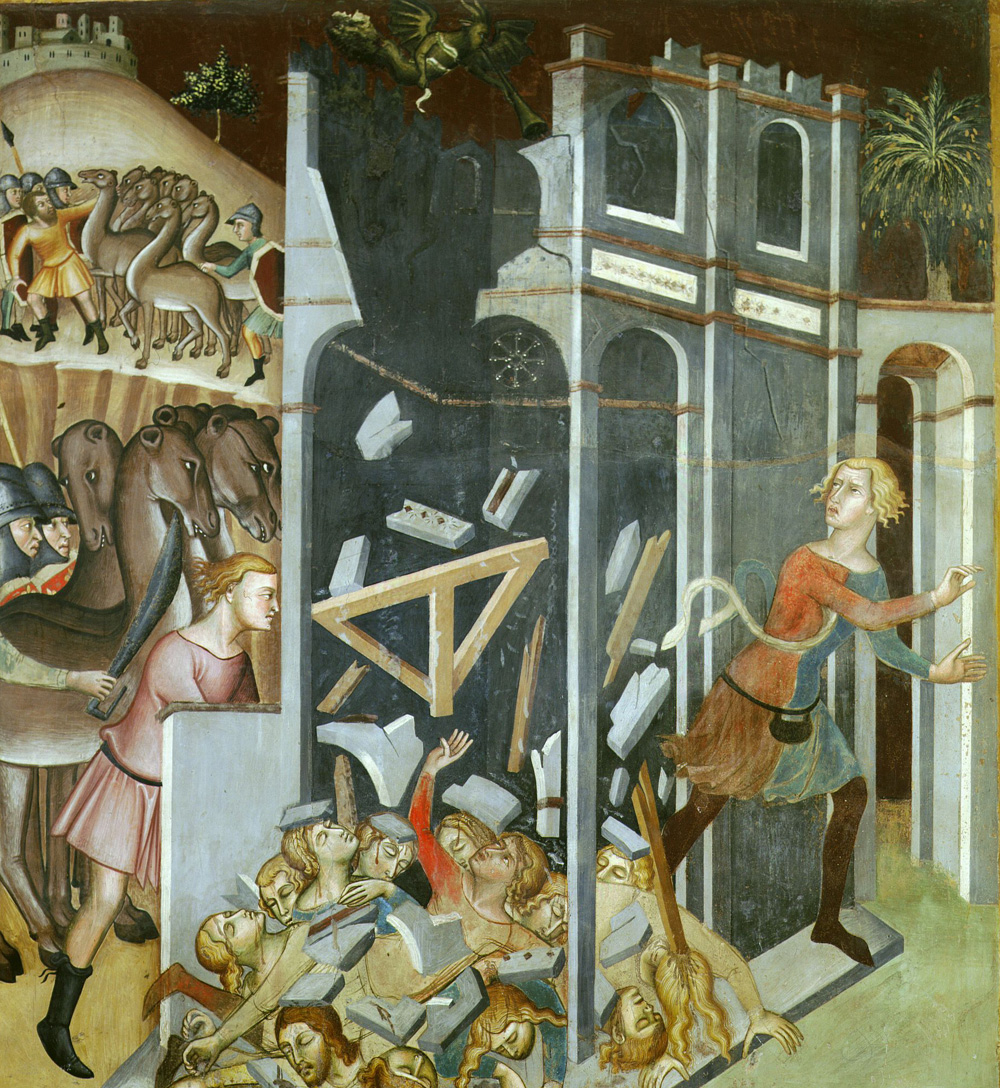
The Destruction of the House of Job and the Theft of His Herd by the Sabians, by Bartolo di Fredi, 1536. © Collegiata, San Gimignano / Bridgeman Images.
Mere sociability, even a strong social contract, amounts to an equivocal benefit in tragic straits: whatever support it may tender, it also marks the pale one is poignantly beyond. The friends who come to commiserate with Job in his affliction are also part of his affliction. “Miserable comforters are you all.” They purport to bring consolation but all they offer is judgment, not only in the moralistic pronouncements they employ to uphold their sense of a rational universe in which only the wicked suffer while the righteous have a high old time, but also in their alienating personification of the “happy norm.” If Job can just hang on till the holidays, Eliphaz and Bildad will send him Christmas cards with rapturous reports of how Chip and Chelsea are acing medical school. And what about you, Job? What are your kids up to these days?
None of this is to suggest that the eradicable fact of disaster or the inconsolable nature of tragedy ought to nullify our impulse toward social progress. To my mind they ratify the impulse: they give us stronger incentives to achieve the greatest measures of social justice and human kindness that we can. Tornadoes are bad enough without torture. On moral imperatives Katrina is more eloquent than Kant [Königsberg, page 61]. The same possibility of disaster that inspires the survivalist refutes his claim that in a more socialistic society we become weak, aimless, incapable of heroic action and all the rest. Tell that to a tsunami. The true knight need never fear the obsolescence of his chivalrous heart. Raze the castles and there will still be sandbags to pile against the flood. Strike down the corporate leviathans; there will be other dragons to slay.
Or to be slain by. The dragon Disaster may not love the valiant but it hates the glib. It stands ever at the ready to remind us that our covenants are not comprehensive, that insurance policies written to cover “acts of God” may not cover refusals to act on the part of women and men. God promises Noah he will never again flood the earth; he does not promise that Noah’s descendants might not succeed in flooding New York. Or that the promise of the rainbow applies to asteroids too. Disaster laughs at every attempt to write its epitaph. Any valedictory words can be undone, rendered moot, turned into a joke by a single fiery sneeze. I imagine some people become violent and cruel as a way of counteracting that vulnerability, as if the best way to avert disaster is to become disaster oneself, to beat it to the punch. Others adopt a defensive humility, like those limber trees Sophocles praises for bending in the gale. Maybe if I stoop low enough, bad luck won’t notice I’m here. Still others choose extraordinary compassion, like the aptly named Constance, more constant than disaster if not quite its match. No doubt we would have found all these kinds of people tending their gardens in the backyards of Pompeii.
